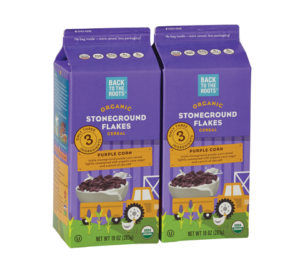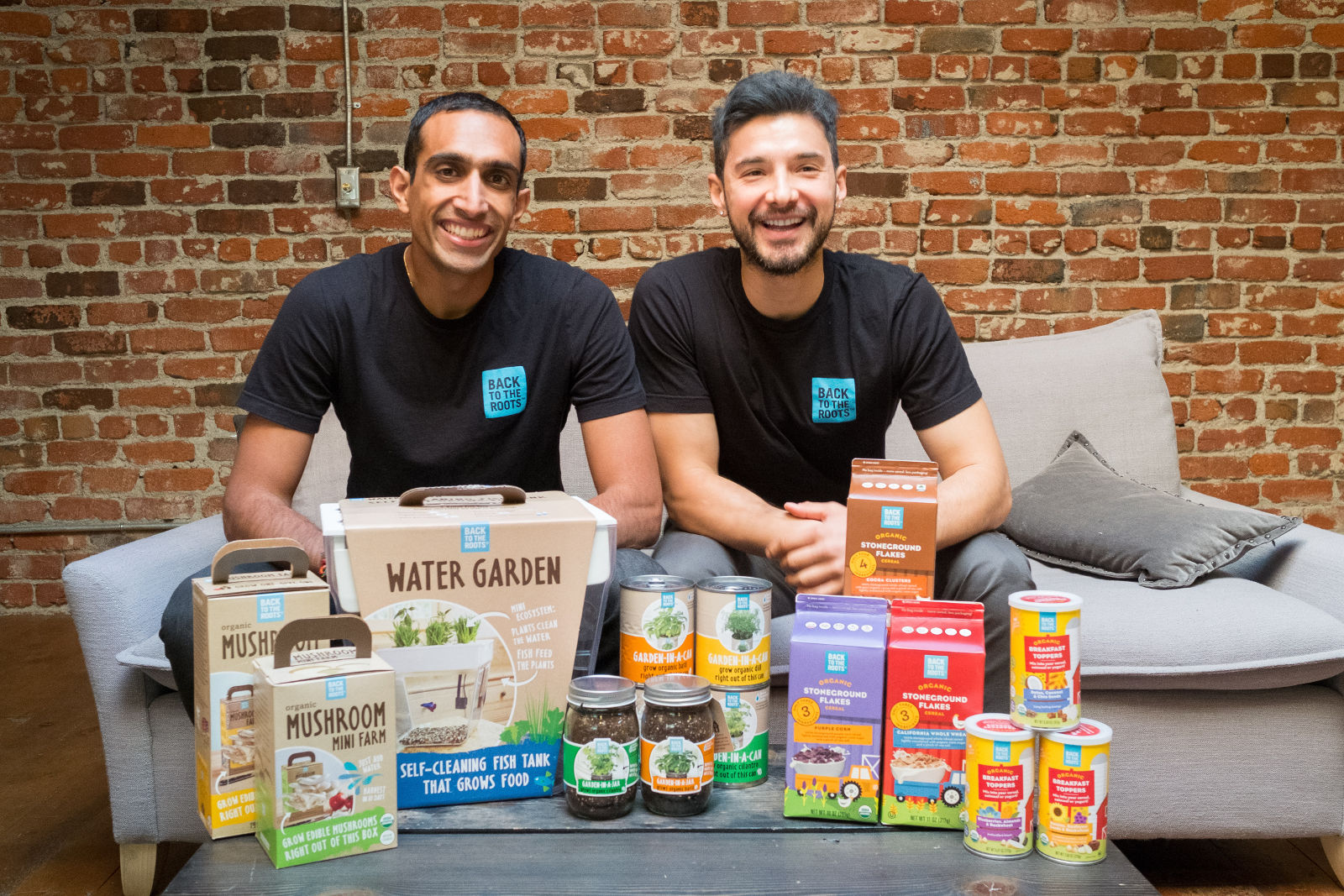A thriving venture grows from another company’s waste… the waste from that enterprise spawns another valuable commodity…and so it goes. Sustainability and upcycling are taken to another level. A passion for transparency spurs a promising launch of a refreshingly simple product in the highly competitive cereal industry—striking a chord with consumers wanting “real” food they can connect with and trust.
Back to the Roots began in Oakland, CA in 2009, born from the curiosity of two University of California Berkeley seniors to see if mushrooms could really grow from recycled coffee grounds. Their enterprise has flourished as well as the mushrooms have—while tickling the hearts of schoolchildren as they marvel at the magic of growing their own food.
“What organic brands were for baby-boomers, radically transparent and simple brands will be for millennials and their kids,” said Nikhil Arora, co-founder with Alejandro Velez.
Back to the Roots’ vision is nothing short of “undoing food”—stripping away the complexity found in categories, patents, ingredients you can’t pronounce or recognize, and secrecy about how food is produced. They are convinced that returning to the simplest ingredients and embracing food origins will lead to healthier eating. Non-GMO is inherent in the mix. They want to create grocery aisles (packaged foods) that are as clean and transparent as produce aisles.
“Transparent is the new clever,” Nikhil said. “Food shouldn’t be secretive.”
How do your mushrooms grow?
Nikhil and Alejandro met by chance, connected by a professor who happened to mention that mushrooms could be grown from spent coffee grounds. Alejandro was heading off to New York for an investment banking job, and Nikhil to a consulting position, but the idea intrigued them. One bucket of the ten they tried produced a bouquet of oyster mushrooms, and they took the exotic-looking clump of fungi to Berkeley Whole Foods. The taste test succeeded. By early 2010, 500 pounds a week were grown and sold all over the region. In six months, they had progressed from selling at a single Whole Foods store to nationwide distribution.
Every day, the two collected coffee ground waste from Peet’s Coffee & Tea shops, and Peet’s decided to pay them for waste collection. They also offered to put a $2 Peet’s coupon into each kit, amplifying marketing efforts. When Nikhil and Alejandro needed to get rid of their own coffee waste, they discovered a compost market: now the waste is sold as a Premium Soil Amendment in every Whole Foods in California.
“We made a business from collecting waste, and now we’re able to sell our own waste,” Alejandro explained during a TED talk.
Customers visiting the organic mushroom farm wanted to try growing their own, so the company transitioned to selling mushroom kits. Sodexo, a massive food service provider, has partnered with Back to the Roots to bring Ready to Grow kits to 3,600 schools. Within ten days, kids can watch their mushrooms begin to grow out of the box. Other products were created: Garden-in-a-Can and Garden-in-a-Jar for growing organic basil, cilantro, and dill; the Organic Self-Watering Planter that easily sprouts organic cherry tomatoes; and the Water Garden, a self-cleaning fish tank that grows food—fish feed the plants, plants clean the water.
Whole Foods and Home Depot were the first large retailers, but now thousands of locations offer Back to the Roots products, including Costco, Nordstrom, Target, Safeway, Wegmans, Sam’s Club, and Home Shopping Network.
Expanding to “Ready to Eat”
In 2014, Back to the Roots had 2 products—now there are 18. From two employees they’re up to 16. Their brick-lined, creature-comfy headquarters in Oakland feels like a creativity-incubator, boards filled with Daring Greatly-style quotes.

Back to the Roots Purple Corn Flakes is made from purple corn grown in Minnesota
The recent focus gathers around the challenge of reinvigorating a declining, image-troubled cereal industry. The company launched Organic Stoneground Flakes at Expo West in March 2015, a product containing only three ingredients: organic California stone-milled wheat, organic sugar, and sea salt from San Francisco Bay. Organic Purple Corn Flakes follows the formula, with Minnesota purple corn. Organic Breakfast Toppers add some chia and sunflower seeds, nuts, and dates for a more nutritional breakfast. Even the packaging is outside the box; the cereals are packed in a milk-type carton with no bag.
“We wanted the simplest, most sustainable cereal possible—we’ve got the recipe on the box so you can make it yourself,” said Nikhil.
Passion and integrity attract investors, awards
The two founders “bootstrapped” for the first five years. As things grew, funding followed; this past July the company became a $10 million Series A investment. They are a B-Corp certified company, defined by social and environmental performance as much as profit.
An impressive list of investors have sensed the vision behind Back to the Roots, including Gary Hirshberg (Stonyfield Farm), Jon Foraker (president, Annie’s), food writer Michael Pollan, Kevin Cleary (Clif Bar), and Jon Weinberg (Sephora).
The company has received numerous awards, for innovation (Forbes 25, Wall Street Journal), product quality (Supermarket Guru), and sustainability and social impact (Champions of Change award from the White House).
Nikhil and Alejandro see their efforts transcending the old model of supplier/customer.
“We’re entering a new age of business with a shifting paradigm—a conscious approach where purpose and profit go hand-in-hand, where you can do good with each dollar of revenue,” Nikhil noted. “Food is so real, it’s so tangible. There’s something really special about connecting families with their food and feeding them well with the best ingredients.”









